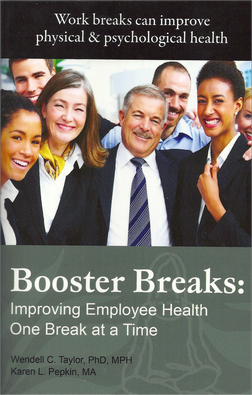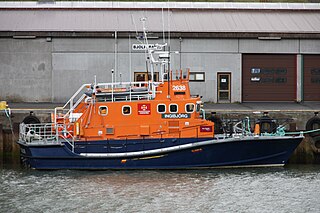Related Research Articles

Team building is a collective term for various types of activities used to enhance social relations and define roles within teams, often involving collaborative tasks. It is distinct from team training, which is designed by a combine of business managers, learning and development/OD and an HR Business Partner to improve the efficiency, rather than interpersonal relations.

Workers' compensation or workers' comp is a form of insurance providing wage replacement and medical benefits to employees injured in the course of employment in exchange for mandatory relinquishment of the employee's right to sue his or her employer for the tort of negligence. The trade-off between assured, limited coverage and lack of recourse outside the worker compensation system is known as "the compensation bargain.” One of the problems that the compensation bargain solved is the problem of employers becoming insolvent as a result of high damage awards. The system of collective liability was created to prevent that and thus to ensure security of compensation to the workers.

An office is a space where the employees of an organization perform administrative work in order to support and realize the various goals of the organization. The word "office" may also denote a position within an organization with specific duties attached to it ; the latter is an earlier usage, office as place originally referring to the location of one's duty. In the adjective form, the term "office" may refer to business-related tasks. In law, a company or organization has offices in any place where it has an official presence, even if that presence consists of a storage silo, for example, instead of a more traditional establishment with a desk and chair. An office is also an architectural and design phenomenon, including small offices, such as a bench in the corner of a small business or a room in someone's home, entire floors of buildings, and massive buildings dedicated entirely to one company. In modern terms, an office is usually the location where white-collar workers carry out their functions.
Facility management or facilities management (FM) is a professional management discipline focused on the efficient and effective delivery of logistics and other support services related to real property and buildings. It encompasses multiple disciplines to ensure functionality, comfort, safety and efficiency of the built environment by integrating people, place, process and technology, as defined by the International Organization for Standardization (ISO). The profession is certified through Global Facility Management Association member organizations.

Sponsoring something is the act of supporting an event, activity, person, or organization financially or through the provision of products or services. The individual or group that provides the support, similar to a benefactor, is known as the sponsor.

Science Olympiad is an American team competition in which students compete in 23 events pertaining to various fields of science, including earth science, biology, chemistry, physics, and engineering. Over 7,800 middle school and high school teams from 50 U.S. states compete each year. U.S. territories do not compete; however, since 2012 high school teams from Japan have competed at the national tournament as unranked guests.

Day camps also known as summer camps in some areas, are recreational programs designed to provide children with a fun and enriching experience during the summer or school breaks. Unlike residential or overnight camps, day camps operate during daytime hours, allowing children to participate in various activities and return home each evening. These camps offer a wide range of supervised activities, fostering socialization, learning, and personal growth in a safe and supportive environment. Day camps can be booked by the day or by the week, or month depending on the institution organizing them. Programs are typically available for kids ages 3-17, but the specific age range can vary depending on the camp's focus and structure. The most popular ages for summer day camps are typically ages 5-10.
Worker centers are non-profit community-based mediating organizations that organize and provide support to communities of low wage workers who are not already members of a collective bargaining organization or have been legally excluded from coverage by U.S. labor laws. Many worker centers in the United States focus on immigrant and low-wage workers in sectors such as restaurant, construction, day labor and agriculture.
Corporate entertainment describes private events held by corporations or businesses for their staff, clients or stakeholders. These events can be for large audiences such as conventions and conferences, or smaller events such as retreats, holiday parties or even private concerts.

Booster Breaks: Improving Employee Health One Break at a Time is a 2010 book. Booster breaks are defined as: "organized, routine work breaks intended to improve physical and psychological health, enhance job satisfaction, and sustain or increase work productivity." Dr. Wendell C. Taylor is recognized as the architect of the Booster Break concept. The intent of Booster Breaks is to encourage health-enhancing breaks during the work day as a corrective to job stress and sedentary behavior. Examples of Booster Breaks are physical activity, meditation, or breath training. Even for brief sessions of 10 to 15 minutes, a routine practice of any of the preceding examples can produce physical, psychological, and/or mental benefits.

Play is a range of intrinsically motivated activities done for recreational pleasure and enjoyment. Play is commonly associated with children and juvenile-level activities, but may be engaged in at any life stage, and among other higher-functioning animals as well, most notably mammals and birds.
The British Occupational Hygiene Society (BOHS) is a Chartered, science-based, charitable body that provides information and expertise about workplace health risks or occupational hygiene. As of 2020, its chief executive officer is Kevin Bampton.
Workplace Strategy is the dynamic alignment of an organization's work patterns with the work environment to enable peak performance and reduce costs.

Slysavarnarfélagið Landsbjörg or the Icelandic Association for Search and Rescue (ICE-SAR) is a national association of rescue units and accident prevention divisions. Its member organizations consist of 99 rescue units, 70 accident prevention and women's divisions and 50 youth sections. Altogether the association has about 10,000 volunteer members and are present in most towns. Although the rescue teams function as a kind of public service, they are not supported or paid for by the government but by donation.
Positive psychology is defined as a method of building on what is good and what is already working instead of attempting to stimulate improvement by focusing on the weak links in an individual, a group, or in this case, a company. Implementing positive psychology in the workplace means creating an environment that is more enjoyable, productive, and values individual employees. This also means creating a work schedule that does not lead to emotional and physical distress.
Workplace relationships are unique interpersonal relationships with important implications for the individuals in those relationships, and the organizations in which the relationships exist and develop.
Activity-based working (ABW) is an organisational strategic framework that recognises that people perform different activities in their day-to-day work, and therefore need a variety of work settings supported by the right technology and culture to carry out these activities effectively. Based on activity, individuals, teams, and the organisation are empowered to achieve their full potential by developing a culture of connection, inspiration, accountability, and trust. On a personal level, Activity Based Working also enables each person to organise their work activities a way that best suits what they need to do, and who they need to do it with, promoting productivity and engagement at work. Although not normally implemented as a cost-saving business strategy, it can produce efficiencies and cost savings through more effective collaboration and team work. Inspiring spaces that evolve from an activity-based approach are designed to create opportunities for a variety of workplace activities, ranging from intense focus work to collaborative settings, as well as areas for impromptu or more formal meetings.
The Istituto nazionale per l'assicurazione contro gli infortuni sul lavoro, or INAIL, is an Italian statutory corporation overseen by the Ministry of Labour and Social Policies. Its headquarters is in the INAIL Tower in the EUR, Rome.

Work or labour is the intentional activity people perform to support the needs and wants of themselves, others, or a wider community. In the context of economics, work can be viewed as the human activity that contributes towards the goods and services within an economy.

Mr T v. Cubik Partners was the November 9, 2022 French Court of Cassation decision number Q 21-15.208 that found that Mr T's right to freedom of expression was infringed when he was terminated for refusing to take part in work mandated social activities.
References
- ↑ "When the Fun Is Mandatory, and You're Helping Pay for It". NYT. Retrieved 22 November 2023.
- ↑ "Forcing workers to be happy with mindless fun can work against you, experts say". The Globe and Mail. Retrieved 22 November 2023.
- ↑ "The Downside of Mandatory Fun in the Workplace". Wharton Business Daily. Retrieved 22 November 2023.
- ↑ "The death of 'mandatory fun' in the office". BBC. Retrieved 22 November 2023.